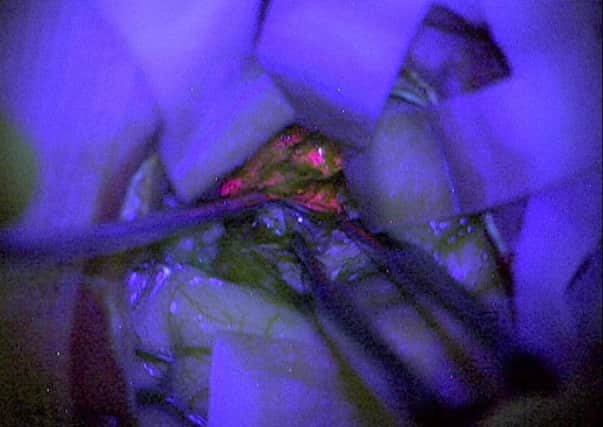Fluorescent marker aids brain cancer surgery


The research was carried out with patients who had suspected glioma, the disease that killed Dame Tessa Jowell, and the most common form of brain cancer.
Treatment usually involves surgery to remove as much of the cancer as possible, but it can be challenging for surgeons to identify all of the cancerous cells while avoiding healthy brain tissue.
Advertisement
Hide AdAdvertisement
Hide AdExperts say that using the fluorescent marker helps surgeons to distinguish the most aggressive cancer cells from other brain tissue and they hope this will ultimately improve patient survival.
The researchers used a compound called 5-aminolevulinic acid or 5-ALA, which glows pink when a light is shined on it.
Previous studies show that when consumed, 5-ALA accumulates in the fast-growing cancer cells and means it can act as a fluorescent marker of high-grade cells.
The trial will take place at the start of the National Cancer Research Institute (NCRI) Conference which runs from today until Tuesday at the Scottish Event Campus in Glasgow. The event showcases the latest advances in cancer research.
Prof Anthony Chalmers, chair of NCRI’s Clinical and Translational Tadiotherapy Research Working Group, said the chemical was used for patients with high-grade gliomas.
He added: “There is a desperate need for better treatments for brain tumours and to achieve that we need more high quality research in this area. The benefit of using a fluorescent marker is that it helps neurosurgeons see more accurately where the high-grade cancer is within the brain, in real time. In treating cancer, we are trying to improve survival by tailoring treatments to each individual patient.”
Dr Paul Brennan, from the Cancer Research UK Edinburgh Centre, said: “It’s crucial that more accurate and kinder treatments are developed for brain cancer patients. Damaging healthy brain cells during surgery can result in lasting complications, such as memory loss or issues with processing information.
“Highlighting the more aggressive tumour cells in real-time could help doctors achieve the delicate balance between removing as much of the tumour as possible while preserving surrounding healthy tissue.”